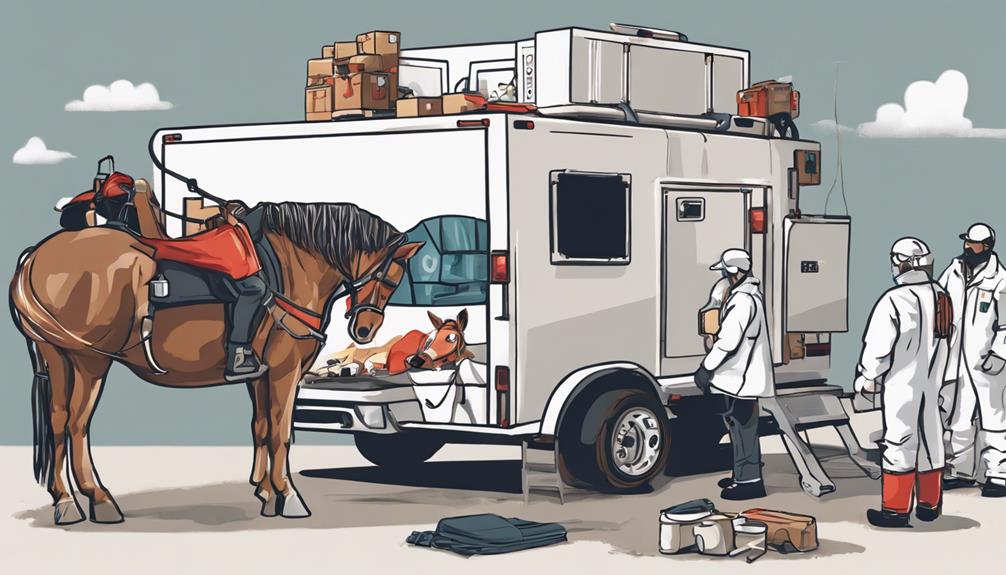10 Best Practices for International Horse Transportation
Embarking on the journey of international horse transportation is akin to navigating uncharted waters with your equine companion. As you dive into the complexities of moving horses across borders, it's crucial to understand the ten best practices that can make or break a successful journey.
From meticulous documentation to emergency preparedness, each practice plays a vital role in ensuring a smooth and safe transit for your horse.
Let's explore these essential guidelines to guarantee a seamless international transportation experience.
Proper Documentation for Equine Travel
When transporting horses internationally, ensure you have all the necessary documentation readily available. This includes essential paperwork such as passports, ownership certificates, and health records. In addition to these documents, it's advisable to have travel insurance to protect against any unforeseen circumstances that may arise during transit. Make sure to review the policy details carefully to understand what's covered and how to make a claim if needed.
Language barriers can be a significant challenge when traveling with horses to foreign countries. It's crucial to have all your documents translated into the local language of the destination country to avoid any misunderstandings or delays at customs. Consider hiring a professional translator or using reputable translation services to ensure accuracy.
Having the right documentation and understanding the importance of travel insurance and overcoming language barriers will help streamline the international horse transportation process. By being prepared and proactive, you can ensure a smoother journey for your equine companions. Remember, thorough preparation is key to a successful and stress-free travel experience for both you and your horses.
Health Certificates and Vaccination Requirements
Having the necessary health certificates and meeting vaccination requirements is essential for international horse transportation. When transporting your horse across borders, vet approvals and proper documentation are crucial. Each country has specific export regulations that must be adhered to, including health certificates signed by a licensed veterinarian.
Border crossings require meticulous attention to detail. Ensure your horse's vaccinations are up to date according to the destination country's requirements. Some countries may have specific vaccination schedules that need to be followed before entry is permitted. Failure to meet these vaccination requirements can result in delays or even refusal of entry at the border.
Before embarking on your journey, research the vaccination protocols of the country you're traveling to. Make sure your horse is vaccinated accordingly and that all necessary paperwork is in order. By taking these precautions, you can avoid any complications during border crossings and ensure a smooth transportation process for your equine companion. Remember, following the export regulations and vaccination schedules diligently is key to a successful international horse transportation experience.
Choosing Reputable Transport Companies
For reliable international horse transportation, selecting a reputable transport company is paramount. When choosing a transport company, ensure they prioritize transport safety and have a solid company reputation. Here are some key factors to consider:
- Safety First: Look for a company that places a high emphasis on the safety and well-being of the horses during transport. Check if they've experienced staff, well-maintained vehicles, and proper safety protocols in place.
- Reputation Matters: Research the company's reputation within the equestrian community. Read reviews, ask for references, and inquire about their track record with previous clients. A reputable company will have positive feedback and a history of successful transports.
- Certifications and Licenses: Verify that the transport company holds all necessary certifications and licenses for international horse transportation. This ensures they comply with industry standards and regulations.
- Communication and Transparency: Choose a company that maintains open communication throughout the transportation process. They should provide clear information on schedules, routes, and any potential issues that may arise.
Customized Travel Plans for Horses
To ensure the comfort and safety of your horse during international transportation, creating customized travel plans is essential. When planning your horse's journey, consider their dietary restrictions and stress management needs. Start by consulting with a veterinarian to establish a suitable diet plan for the trip. Some horses may require specific feeds or supplements, so ensuring that these dietary requirements are met can help prevent digestive issues and maintain their overall well-being during travel.
Stress management is another crucial aspect to address when customizing your horse's travel plans. Implement strategies to help your horse stay calm and relaxed throughout the journey. This can include familiarizing them with the transportation equipment in advance, practicing loading and unloading procedures, and incorporating regular breaks during long trips to allow for rest and relaxation.
Ensuring Comfort and Safety in Transit
Customizing your horse's travel plans ensures their comfort and safety during transit, with a focus on addressing key aspects such as dietary needs and stress management. To ensure your horse's well-being while on the move, pay attention to the following:
- Bedding Preferences: Provide familiar bedding materials to keep your horse comfortable and reduce stress during the journey. Familiar scents can help in creating a sense of security for your equine companion.
- Feeding Schedules: Stick to your horse's regular feeding schedule as much as possible. Changes in diet or feeding times can lead to digestive issues and discomfort. Ensure access to fresh water throughout the journey.
- Temperature Control: Monitor the temperature inside the transportation vehicle. Ensure it's within a comfortable range for your horse. Extreme temperatures can cause distress and health issues.
- Ventilation Requirements: Proper ventilation is crucial to maintain a fresh airflow for your horse. Stagnant air can lead to respiratory problems. Check that the vehicle provides adequate ventilation to keep your horse breathing comfortably.
International Quarantine Regulations
When transporting horses internationally, adherence to quarantine regulations is vital to prevent the spread of diseases and ensure the health and safety of all equine passengers. International quarantine regulations are put in place to safeguard the horse population from contagious illnesses. Before embarking on your journey, it's crucial to familiarize yourself with the specific requirements of the destination country regarding quarantine procedures.
Quarantine facilities play a significant role in the transportation process. These facilities are designated areas where horses are isolated upon arrival to prevent the potential spread of diseases. Ensuring that these facilities meet the necessary standards is essential for the well-being of the horses. Additionally, having travel insurance that covers any potential quarantine costs can provide peace of mind in case unexpected situations arise.
Failure to comply with international quarantine regulations can result in severe consequences, such as delays in transportation, hefty fines, or even the denial of entry for your horses. By carefully following these regulations and ensuring that your horses are healthy and up to date on all vaccinations, you not only protect your equine companions but also contribute to global biosecurity efforts.
Handling Emergency Situations Abroad

Upon encountering unforeseen emergencies while transporting horses internationally, swift and informed decision-making is crucial to ensure the safety and well-being of the equine passengers. In these high-stress situations, it's essential to have a clear plan in place to respond effectively.
Here are some key steps to handle emergency situations abroad:
- Emergency Response Plan: Develop a detailed emergency response plan before the journey, outlining procedures for different scenarios such as accidents, illnesses, or natural disasters.
- Communication Protocols: Establish clear communication protocols with all involved parties, including veterinarians, transport staff, and local authorities, to ensure swift coordination in case of an emergency.
- Emergency Contacts: Keep a list of emergency contacts handy, including veterinarians, local animal hospitals, and transport company representatives, to facilitate quick communication and decision-making.
- Regular Training: Provide regular training sessions for all personnel involved in the transportation process to ensure everyone is familiar with emergency procedures and protocols.
In times of crisis, being prepared and having effective communication channels can make a significant difference in the outcome of an emergency situation. By following these best practices and staying proactive, you can help mitigate risks and ensure the safety of the horses during international transportation.
Post-Travel Health Monitoring
After completing an international journey with your horses, it's essential to promptly initiate post-travel health monitoring to ensure their well-being. Once your horses arrive at their destination, schedule veterinary check-ups to assess their health status. It's crucial to monitor for any signs of illness or stress that may have developed during the trip.
Following international travel, implementing quarantine protocols is advisable to prevent the spread of any potential diseases. Quarantine allows for the observation of your horses in a controlled environment, reducing the risk of introducing infectious agents to other animals. During this period, maintain strict biosecurity measures to safeguard the health of all equines on the premises.
Regular veterinary check-ups during the post-travel period are vital to detect any health issues early on. These check-ups should include thorough physical examinations, monitoring of vital signs, and any necessary diagnostic tests. Your veterinarian can provide guidance on appropriate nutrition, hydration, and exercise routines tailored to your horses' specific needs post-travel.
Frequently Asked Questions
Are There Any Specific Requirements or Restrictions for Transporting Pregnant Mares Internationally?
When transporting pregnant mares internationally, there are specific requirements and restrictions to consider. Preparing facilities and ensuring veterinary checks are essential.
Handling stress and implementing safety measures throughout the journey is crucial for the well-being of the mare and foal. It's vital to adhere to regulations and guidelines to ensure a safe and comfortable trip for the pregnant mare.
How Can I Ensure My Horse's Dietary Needs Are Met During Long-Distance Travel?
To ensure your horse's dietary needs are met during long-distance travel, focus on water intake and grazing. Offer water frequently and provide opportunities for your horse to graze when possible.
Pack enough hay and supplements for the journey to maintain their nutrition. By paying attention to these factors, you can help your horse stay healthy and comfortable throughout the trip.
What Measures Should Be Taken to Prevent Motion Sickness or Stress-Related Issues During Transportation?
To prevent motion sickness and manage stress during transportation, ensure your horse has:
- Proper ventilation
- Comfortable bedding
- Access to water
Limit sudden movements and provide frequent breaks for rest. Familiarize your horse with the trailer before long journeys to reduce anxiety. Consider using calming supplements or consulting with a veterinarian for additional support.
Monitoring your horse's behavior and adjusting transport conditions accordingly can help minimize motion sickness and stress-related issues.
Are There Any Special Considerations for Transporting Foals or Young Horses Across Borders?
When moving young horses across borders, it's crucial to consider special requirements. Foals need gentle handling and proper training methods to reduce stress.
Health certifications are essential to ensure their well-being during travel. Make sure to meet all regulations for transporting young horses to guarantee a safe and smooth journey.
How Can I Prepare My Horse for the Potential Climate and Environmental Changes During International Travel?
When getting ready for international travel with your horse, you should focus on climate adaptation and environmental acclimatization.
Make sure your horse is used to different weather conditions by gradually exposing them to new environments. Provide proper grooming, hydration, and nutrition to help them adjust better.
Monitor their health and behavior closely during the journey.
Conclusion
Overall, when it comes to international horse transportation, it's essential to prioritize proper documentation, health certificates, and choosing reputable transport companies.
Customized travel plans, ensuring comfort and safety, and being aware of quarantine regulations are also key factors.
Handling emergency situations abroad and monitoring post-travel health are crucial for the well-being of your horses.
By following these best practices, you can ensure a smooth and successful journey for your equine companions.
